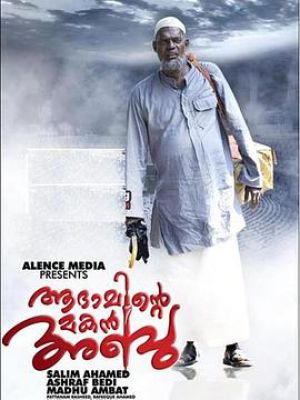亚当之子:阿布

- 别名:Adaminte Makan Abu / Abu, Son of Adam
- 类型:剧情
- 导演:SalimAhamed
- 编剧:SalimAhamed
- 主演:SalimKumar/ZarinaWahab
- 制片地区:印度
- 影乐酷ID:5156092dv
- IMDB:tt1945039
- 语言:马拉雅拉姆语 Malayalam
- 片长:101分钟
- 上映:2011-06-24
- 国内票房¥:暂无
- 全球票房$:暂无
- 简介:The film tells the story of a poor attar (a kind of perfume) seller Abu (Salim Kumar) whose only remaining wish in life is the Hajj pilgrimage, which he strives hard to fulfill, and at the verge of the fulfillment, he opts out when he fears that the means is not fully legitimate. Development on the film began roughly a decade before the film was released. The film was shot digitally over one month beginning on 7 November 2010. Thrissur and Kozhikode in Kerala, India were the major filming locales. Distributed by Laughing Villa, a distribution company owned by Salim Kumar, and Allens Media, Adaminte Makan Abu released in theatres on 24 June 2011. It received wide critical acclaim, with numerous praises for its story, direction, cast, cinematography, and score. It received honours for its music, cinematography and writing, as well as for Salim Kumar's performance. At the 58th National Film Awards, the 2010 awards for the best in Indian cinema, it earned four major national awards: for Best Film, Best Actor (Kumar), Best Cinematography and Best Background Score. It performed similarly at the Kerala State Film Awards, where it won the awards for Best Film, Best Actor, Best Screenplay and Best Background Music. Abu (Salim Kumar) and Aishumma (Zarina Wahab) are an elderly Muslim couple living in Kerala's Malabar. Their aspiration is to go for Hajj, and they sacrifice to achieve this aim. Their son Sathar has migrated to the Middle East with his family and has virtually discarded his parents. Now in their late 70s, the couple decide to go for Hajj that year. Abu sells attar (a perfume obtained from flowers), religious books and Unani medicines that nobody seems to want. Aishumma breeds cattle and hens, helping her husband realize their shared dream. Abu feels as outdated and discarded by a fast-changing world as the traditional products that he sells. A school teacher (Nedumudi Venu), Abu's friend, comes to his aid at his time of need. Hyder (Suraj Venjarammoodu), a local teashop owner also empathises with Abu who in turn is frequently given genuine advice by a mysterious saint known simply as Ustad (Thampi Antony). Good-natured people try to help Abu by offering to loan him the amount, but as this goes against the accepted practices of the religion, he refuses to take anything. With the advancing years, Abu's desperation also grows. Finally, in frustration and distress, Abu gives away his cow and old jackfruit tree. Abu is helped by the manager of a travel agency (Mukesh) to get tickets and other documents for his journey. A policeman (Sasi Kalinga), initially tries to reject Abu's passport application, but once he gets his bribe he becomes quite helpful. The couple begins their preparations which include attending the Hajj preparation classes conducted by the travel agency, being vaccinated for meningococcal meningitis and buying new Ihram clothing. Abu pays off even the smallest of his old debts as part of the preparations and travels miles to seek forgiveness from Sulaiman, a previous neighbour with whom he once fought. When the passports and the tickets are ready and a bus journey away in Kozhikode, the sawmill owner (Kalabhavan Mani) while handing over the money for Abu's tree says that its wood turned out to be rotten and useless. He insists that Abu still take the money, however, since his cause is noble. Abu refuses it, saying that it wouldn't be halal and hence could anger Allah. When he is sure that he cannot fulfill his dream, Abu reaches another conclusion – that the tree too had life, and several lives must have died when he cut the tree in front of his house. Abu conjectures that that maybe one of the reasons for his not being able to go on the journey. On the dawn of the Hajj, Abu tells his wife that they will go the next year, and he is seen going to the mosque to pray on the morning of Hajj. wiki











